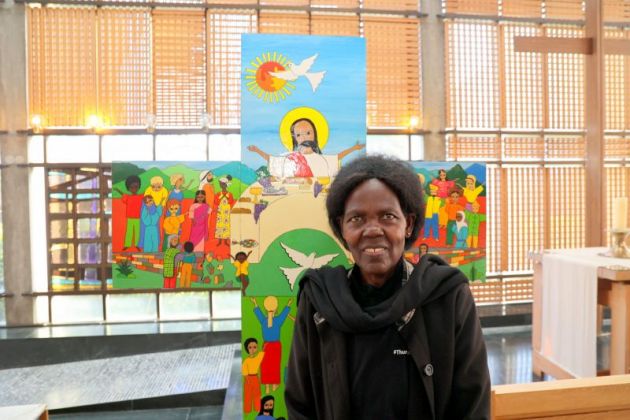Program to Combat Racism launched during apartheid; now churches focus on xenophobia, other issues

When the World Council of Churches launched the Program to Combat Racism after years of in-depth theological reflections and prayer in 1971, South Africa's racist apartheid policies were in full throw.
The program brought the WCC into the world's spotlight and at the time the wrath of the South African government as the council began to align increasingly with liberation movements and churches combatting apartheid inside South Africa.
Yet racism did not start 50 years ago. And it did not end with the casting out of apartheid at the end of the 20th century. During that era, figures such as Nobel Peace Prize laureates, Archbishop Desmond Tutu and Nelson Mandela fought racism in society and the church.
The WCC acting general secretary, Rev. Ioan Sauca, said at the start of a hybrid three-day conference on Racial Discrimination and Xenophobia in Geneva on Dec 7 that "the sin of racism has always been a great concern for the WCC.
"The events of the past decade have especially impressed upon us all the need for concerted efforts to at least mitigate against this sin but ideally to overcome this sin," said Sauca.
COMMITMENT AND PASSION
Speaking to a group from all over the world, Sauca acknowledged "the special skills, commitment and passion" to overcome racism and xenophobia that they are putting into serving the churches and the world.
"It is my hope and prayer that you will use these days of consultation to help us deepen our understanding of the gravity of these sins in all regions of the world and to develop mechanisms of responding to these evils," said Sauca.
"We are aware that racism and xenophobia have been pandemics for a long time and are manifesting themselves in all regions of this world. Many groups of the people of God have suffered in the past, are suffering in the present and will suffer in the future unless we take action."
Sauca said the churches are aware of the experiences of people of African descent, indigenous peoples, people of Asian descent, the Roma people, the Dalit people, and many other groups.
The WCC's central committee moderator, Dr Agnes Abuom, attended the conference, reflecting that the original issue addressed by what became the Programme to Combat Racism was to support the liberation, eventually, of nations and "it was to try to address racism.
"But eventually, it focused on the oppressed, being set free and in that sense, we achieved it," said Abuom. But now the world has to face racism in a different way.
"And now that all the economic factors, the climate issues, inequality," Abuom said, "offer the threat to life across the world, the issues of racism have resurfaced in a different way."
"At the end of the day, if we do not change, it is not even racism that will kill us. It is our mode of relationship to creation, and the planet disappears with all of us," said Abuom. "So we need a transformation of our minds, a renewal of our minds, like Paul says.
"Therefore, we need a confession or repentance that acknowledges God's creation in totality. So that is why today, this issue is much more of an imperative."
The worldwide group had participants from such places as Ghana, Indonesia, Canada and Britain.
They analyzed and evaluated past and present strategies and activities and describe the current battlefronts for overcoming racism, racial discrimination, and xenophobia.
Many of them spoke of how as people of color they have been subject to racism in open and subtle forms.
FUTURE WORK ON RACISM
The consultation considered proposals and recommendations to WCC governing bodies on future work to overcome racism, racial discrimination and xenophobia, especially during critical ecumenical conversations.
Part of the group's work will be shared at the WCC 11th Assembly in Karlsruhe, Germany in 2022.

Various racist events that shocked the world triggered the holding of the meeting.
A massacre at the Emanuel African Methodist Episcopal Church in Charleston, South Carolina in the United States on June 17, 2015 stunned the world, especially the ecumenical movement, as people realized how violent racism was gaining traction worldwide.
On that day, a 21-year-old white supremacist Dylann Roof killed nine African American Christians gathered for a Bible Study.
That tragic event led to the WCC being invited by the National Council of the Churches of Christ in the United States to make a solidarity visit to visit the wounds caused by injustices happening in the world.
That applies especially in colonized territories, where indigenous populations and non-European migrants face racial discrimination in political, economic, religious and social spheres.
Rev. Fykse Tveit, who was general secretary of the WCC in 2015, spoke by video to the hybrid conference. The presiding bishop of the Church of Norway said, of racism and xenophobia, "This is an issue for all continents, for all churches."
INITIATIVES IN USA AND SOUTH AFRICA
"Some of the very important initiatives have come from several regions in the United States of America, but also from South Africa to other parts of the world," said Tveit, mentioning India as well.
"The challenge today is that this is an extremely wide issue," said Tveit. "It affects so many other parts of the world," he said, and relates to gender and health equality in, for example, unequal vaccine distribution.
This 50th Anniversary of the Program to Combat Racism coincides with the launch of the Program to Overcome Racism, Racial Discrimination and Xenophobia.
It is starting due to the increase in racial injustice, racially motivated crimes and violence and the continued strengthening of far-right populist-nationalist political movements spreading ideologies that are racist and xenophobic.
